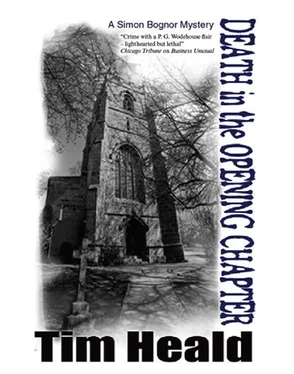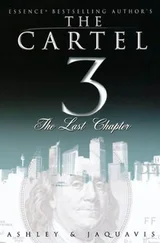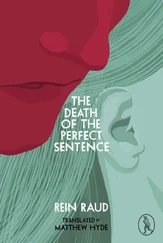Tim Heald - Death in the opening chapter
Здесь есть возможность читать онлайн «Tim Heald - Death in the opening chapter» весь текст электронной книги совершенно бесплатно (целиком полную версию без сокращений). В некоторых случаях можно слушать аудио, скачать через торрент в формате fb2 и присутствует краткое содержание. Жанр: Криминальный детектив, на английском языке. Описание произведения, (предисловие) а так же отзывы посетителей доступны на портале библиотеки ЛибКат.
- Название:Death in the opening chapter
- Автор:
- Жанр:
- Год:неизвестен
- ISBN:нет данных
- Рейтинг книги:5 / 5. Голосов: 1
-
Избранное:Добавить в избранное
- Отзывы:
-
Ваша оценка:
- 100
- 1
- 2
- 3
- 4
- 5
Death in the opening chapter: краткое содержание, описание и аннотация
Предлагаем к чтению аннотацию, описание, краткое содержание или предисловие (зависит от того, что написал сам автор книги «Death in the opening chapter»). Если вы не нашли необходимую информацию о книге — напишите в комментариях, мы постараемся отыскать её.
Death in the opening chapter — читать онлайн бесплатно полную книгу (весь текст) целиком
Ниже представлен текст книги, разбитый по страницам. Система сохранения места последней прочитанной страницы, позволяет с удобством читать онлайн бесплатно книгу «Death in the opening chapter», без необходимости каждый раз заново искать на чём Вы остановились. Поставьте закладку, и сможете в любой момент перейти на страницу, на которой закончили чтение.
Интервал:
Закладка:
‘Not really,’ said Bognor, who was groping.
‘Too deep for me,’ said Vicenza. ‘Not that I care much.’ And she laughed throatily, like one who smoked.
‘It’s quite simple,’ said Allgood. ‘All I’m saying is that truth is relative. Most people think it’s an absolute, but I don’t agree. Apart from anything, it’s fantastically restricting. Once you accept that it’s a question of degree, it opens up any number of possibilities.’
‘You can’t expect me to think that,’ protested Bognor. ‘My whole job is predicated on the basis that the world is black and white, and there is such a thing as right and wrong, guilty and innocent. I am charged with seeking out criminals and bringing them to what we call justice.’
‘I’m glad you entered the caveat,’ said Allgood. ‘At least you appear to be capable of understanding that in real life things aren’t quite as simple as they have to be in your career.’
‘I question which of us is living in “real life”,’ said Bognor. ‘Mine feels pretty real to me.’
‘Touche,’ said Allgood. ‘Mine, likewise. Which just goes to prove the point I’m making. I’m not disparaging your reality, which is real for you; but mine is real for me too. And you should respect it.’
‘Except,’ said Bognor, ‘when you try to proselytize. You’re entitled to a skewed view of what’s real, provided you keep it to yourself and don’t try to inflict it on other people. You know perfectly well that your view of what happened to the Reverend Sebastian is, in our terms, a pure fabrication, but you tried to pretend that it was real in terms that my friends, your audience, understood.’
‘Now you’re being duplicitous,’ said Allgood. ‘I was arguing hypothetically, in your terms. I never pretended otherwise.’
‘That’s not my understanding,’ said Bognor. ‘Did Sebastian write a book? Did he submit it to publishers? Was it rejected?’
Allgood appeared to give this some thought, but when he came up with an answer it was as infuriating as Bognor had feared. It also took little or no account of what he had said hitherto.
‘Maybe,’ he said, ‘maybe not.’
It was the sort of response an Apocrypha don would have produced in one of those infuriating tutorials which had nothing to do with the subject you were supposed to be studying, and everything to do with teaching you dialectic and the art of argument. Monica hated it, even though her own college had practised much the same.
‘Did the vicar write a book?’
A long silence. Eventually, Allgood said, ‘Not in the sense that would stand up in a court of law. I think he could perfectly well have written one, though. And if he had, he would have suffered serial rejections which would have undermined what was, by all accounts, a flimsy sense of self-confidence and self-worth. So, what I said makes perfect sense.’
‘But it’s a fiction,’ said Bognor, angrily.
‘That’s what I deal in,’ said Allgood evenly, ‘and there is a sense in which my fiction is truer than your fact, wouldn’t you agree?’
‘That’s not the point, as well you know.’
‘Oh, but I think it is,’ said Allgood. ‘Life is too literal. Actually, it’s a lot more interesting than plods like you make out.’
Bognor resented being described as a ‘plod’, but refused to rise and said nothing. He could do metaphysics but not professionally. Work was rooted in life and death, just as he believed that books should have beginnings and middles and ends, and anchovies helped out beef casseroles.
‘I don’t have a problem staying interested,’ he said, ‘and in the world I live in, a stiff is a stiff is a stiff, and it’s my job to see how and why a once breathing human can have reached that sorry state. As the meerkat says “simples”. It is too. And quite interesting enough, without injecting hypotheticals.’
‘You would say that, wouldn’t you?’ said Allgood. ‘It’s a point of view. Not one I happen to share, but a point of view nonetheless. I respect it. I just wish you’d do the same for mine.’
Bognor was exasperated.
‘I’m sorry,’ he said, ‘but I have a job to do. I don’t have the luxury of being able to fantasize. Boring old black and white. Tiresome. Limiting. Not as good as writing a book, much less talking about it. But it’s what I do. So, can you just tell me. Did the late vicar write a book? Did he submit it to one or more publishers? Was it rejected?’
‘No,’ said Allgood. ‘Not in so many words. Not literally. Not as far as I know. It’s possible but I have no proof. As you’d describe it.’
‘So, you’ve been wasting my time?’
‘I wouldn’t put it like that,’ said Allgood, ‘but you said it.’
‘I could charge you with wasting official time,’ said Bognor pompously, ‘but I’ll let you off with a warning.’
‘Thank you, I’m sure’, said the novelist. ‘I’d prefer to think that we look at things in a different way. You see black and white and I see grey. I believe in murk, you believe in clarity. Different.’
Bognor reflected that Allgood could be right.
‘Anything I can do, just let me know,’ said Vicenza Book. She looked pert and tousled.
‘Likewise,’ said Allgood.
They raised their glasses.
Bognor wished life was so simple. He exited left.
Perhaps life and death were naturally murky, and his efforts to make them otherwise were necessarily doomed to failure.
Pity.
TWENTY-FOUR
There was a convention involving butlers, but Bognor was damned if he could remember what it was. This may have had something to do with the diminishing number of butlers, who were a dying breed, even if one included the ersatz butlers employed by a certain sort of celebrity hotel in such places as Dubai. Or it may have had to do with Bognor’s natural forgetfulness, or his belief that neither conventions nor butlers mattered much. Either the butler dunnit or he hadn’t. He was either the most suspicious character or the least. Whatever, he had to be interviewed, together with his wife, who in this case, did.
These were their alibis for the time of death: Brandon was buttling and his wife doing. Sir Branwell, Lady Fludd and the Bognors themselves were there to corroborate. They may not have actually been present, but they were at the end of a bell-pull. To have nipped off to church and done the necessary would have involved a completely unacceptable risk. And the Brandons, as was the way Bognor suspected with butlers and doers, were not among the nation’s risk-takers.
It was sometimes assumed that people such as the Brandons no longer existed.
Not true.
Within living memory, well almost within living memory, the Fludds of Mallborne would have employed large numbers of servants, of whom Mr and Mrs Brandon would have been the most important. Before the two socially levelling world wars, the manor would have boasted squads of lower orders, living as a sort of alternative household behind the green baize doors, much in the manner of the household made famous by the TV programme Upstairs, Downstairs in the 1970s. Even quite modest middle-class households would have had a couple of servants who cooked, served, drove and generally performed menial tasks for those upstairs.
People like them were the staples of golden age crime fiction, together with simpering clerics, blustering squires, long-winded lawyers, doctors who did regular ‘rounds’ (sometimes even on horseback) and all the other denizens of a society who knew their place and conformed to type. This world was often thought to have vanished, but it still clung on in places such as Mallborne. It was much diminished, unfashionable, unknown even to the journalists and others who sought to present a picture of contemporary life. But its fall from grace did not mean that this world had vanished. It still clung on.
Читать дальшеИнтервал:
Закладка:
Похожие книги на «Death in the opening chapter»
Представляем Вашему вниманию похожие книги на «Death in the opening chapter» списком для выбора. Мы отобрали схожую по названию и смыслу литературу в надежде предоставить читателям больше вариантов отыскать новые, интересные, ещё непрочитанные произведения.
Обсуждение, отзывы о книге «Death in the opening chapter» и просто собственные мнения читателей. Оставьте ваши комментарии, напишите, что Вы думаете о произведении, его смысле или главных героях. Укажите что конкретно понравилось, а что нет, и почему Вы так считаете.












